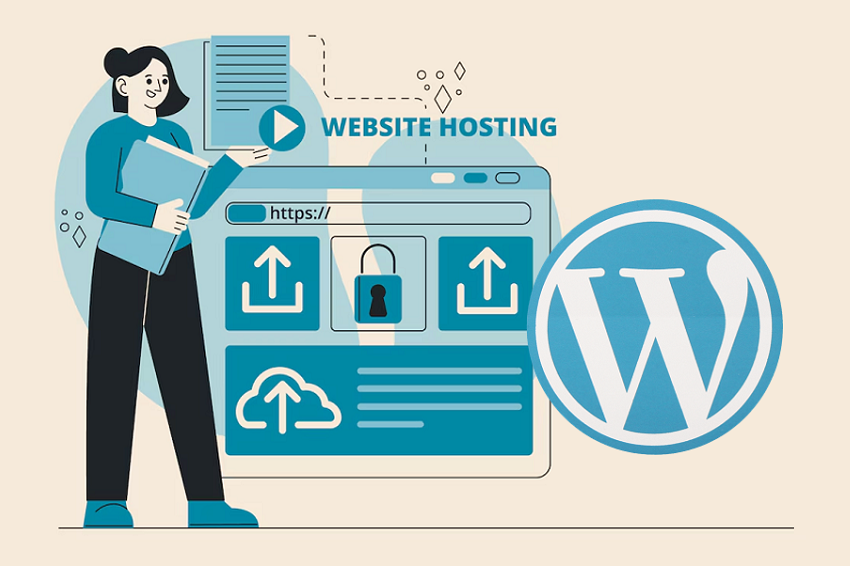Building a website may look like a exceptional task especially for those who are new in the process. As anyone is able to set up an online platform with ease, given some assistance. Something that is extremely important when preparing the launch of a new website is the use of the right hosting services. This article is specifically for you if you have decided to WordPress; let us understand the essential of WordPress Hosting.
WordPress alone has taken the second position, contributing to over 40% of the website platforms across the globe thus powering the most popular content management system (CMS). But to get the best out of WordPress, one must have good website hosting. Regardless of whether you are establishing a blog for personal use, creating an online store or a business site, the type of host is very important in the aspects of speed, stability, and growth. Read on and you will get information on the types of WordPress hosting and factors to consider while making the decision.
What is WordPress Hosting?

WordPress hosting is a hosting service proposed to enhance the performance of your site based on WordPress. It gives a hosting platform that works well with the WordPress environment thus a better performance, security, and ease of management. The regular web hosting can host multiple platforms, but WordPress hosting meets the specialized needs of WordPress sites.
Types of WordPress Hosting
There are several types of WordPress hosting, each suited to different needs and budgets:
Shared Hosting
Shared web hosting means that two or more web sites are placed on the same server, which will share such attributes as bandwidth and storage, and so on. It is cheap and thus suitable for beginners or other websites that do not receive too much traffic. However, the downside is that your site may potentially be affected by other site’s performance on the same server.
Pros:
- Low cost
- Easy setup
Cons:
- Slower performance with high traffic
- Limited resources
Managed WordPress Hosting
The single most important distinguishing feature of managed hosting is that the hosting provider handles the nitty-gritty of the hosting platform such as applying security patches, making backups, and optimizing performance. The main advantage of this type of solution is that it requires little to no interference from the users, those who wish to dedicate their time to writing content only without having to worry about site upkeep.
Pros:
- Automatic updates and backups
- Enhanced security features
- Excellent customer support
Cons:
- Higher cost than shared hosting
- Limited control for advanced users
VPS (Virtual Private Server) Hosting
VPS hosting means your website is on the same server as other websites but the server will be partitioned into private sections. This means you can have more resources and control over your hosting environment as compared to a physical hosting environment. More than the shared hosts, less than the dedicated hosts, virtual private hosts are well suited for websites that have moderate growth.
Pros:
- Better performance and reliability than shared hosting
- More control over the server environment
Cons:
- Requires some technical knowledge.
- More expensive than shared hosting
Dedicated Hosting
Dedicated hosting provides the client with an actual server that is solely used to host his or her site/website. This feature offers the best performance in addition to maximum security and control. It is ideal for big online communities with a great number of active users and massive traffic but it is the costliest solution.
Pros:
- Complete control over server configuration
- Maximum performance and security
Cons:
- Expensive
- Requires advanced technical expertise.
Cloud Hosting
Cloud hosting utilizes the facilities of a number of computers connected in a network and is able to increase or decrease resources depending on the amount of traffic the site receives. This makes it suitable for websites that register varying or lots of traffic within a short period or have high growth rates.
Pros:
- Scalability
- High reliability and uptime
Cons:
- More complex setup
- Can become expensive as traffic grows.
Factors to Consider When Choosing WordPress Hosting
Selecting the right WordPress hosting involves evaluating several key factors:
Performance & Speed
The speed of the site impacts user experience and most importantly SEO. Search for the hosting services which include such as SSD, CDN, and server caching with a view to improving your website’s performance.
Security
The need for secure hosting cannot be overemphasized as this will protect your website from unnecessary vulnerabilities such as malware infection, hacking and many other related risks that are found online. When choosing your hosting provider, make sure they provides you with a firewall and malware checks, automatic backup, and SSL certificate.
Customer Support
For a beginner, it means they should have easy and quality access to customer support. Always select the hosting providers who offer round the clock support, which should be available through several options such as chat, email, and phone.
Backup & Restore Options
There are times that people make a mistake when they are working on certain aspects of the websites and having the copies will be helpful in such instances. Go for a hosting provider that has the preferred auto-backups and convenient methods of restoration in the event of anything wrong.
Pricing
The cost of WordPress hosting is bound to differ for distinct types and the options you allow in your shared, VPS, or dedicated hosting services. Some of the items you will have to consider are the cost and the worth of the budget, it is always good to remember that do not strive so much to cut down costs that you end up compromising on essential features such as security and performance. One must consider cost in relation to the value for money that will be derived from the investment being made.
How to Choose the Right Hosting Plan for Your Website
Choosing the right WordPress hosting plan comes down to understanding your website’s current and future needs. Here are some questions to help guide your decision:
- What type of website are you creating? Small blogs or portfolio websites can get by with shared hosting, while eCommerce or membership sites may need managed or VPS hosting.
- How much traffic do you expect? If you are anticipating heavy traffic, opt for hosting with scalable resources like cloud or VPS hosting.
- What is your budget? Shared hosting is the most affordable option, but if you can invest in managed hosting, you will get more features and support.
- Do you need scalability? If your website’s traffic is expected to grow quickly, cloud or VPS hosting will allow you to scale resources without having to migrate to a new plan.
Setting Up Your WordPress Hosting
Once you have chosen a hosting provider, it is time to set up your WordPress site. Here is a step-by-step guide:
Purchase Hosting and Domain Name
Most hosting providers allow you to register a domain name during the signup process. Choose a domain that reflects your brand and is easy to remember.
Install WordPress
Many hosting services offer a one-click installation feature for WordPress. Simply locate the WordPress installer in your hosting account dashboard, follow the prompts, and your site will be set up in minutes.
Configuring Your WordPress Site
After installation, there are a few initial setup steps to enhance your site:
Choose a Theme
Select a theme that suits your website’s purpose. There are thousands of free and premium themes available. Customize it to fit your brand’s aesthetic.
Install Essential Plugins
Plugins add functionality to your WordPress site. Some essential plugins include:
- Yoast SEO: Helps optimize your content for search engines.
- Wordfence Security: Enhances site security.
- WP Super Cache: Improves site speed through caching.
Keep Everything Updated
Regularly update your WordPress core, themes, and plugins to maintain security and performance.
Optimizing Your WordPress Hosting
To ensure your website runs smoothly, consider the following optimization tips:
Use a Content Delivery Network (CDN)
A CDN distributes your website’s content across multiple servers worldwide, ensuring faster loading times for users regardless of their location. You can check our list of CDN service providers to choose the best one for your website.
Implement Caching Solutions
Caching stores a static version of your site, reducing load times and server strain. Many caching plugins are available to help with this.
Focus on Security and Backups
Invest in security measures and regular backups to protect your site from potential threats. Your hosting provider may offer built-in security features, but additional plugins can provide extra layers of protection.
Troubleshooting Common Hosting Issues
As a beginner, you may encounter various issues. Here are some common problems and solutions:
- Slow Loading Times: Optimize images, use caching plugins, and consider upgrading your hosting plan.
- Site Downtime: Contact your hosting provider for support and check for any server issues on their end.
- Error Messages: Search for the specific error code online or consult your hosting provider for assistance.
Conclusion
Selection of the best WordPress hosting provider is one of the most important steps while creating a website. So, by learning what you have here in this guide, you are in good standing to set up a solid online presence. Take up the learning process well, try out things and do not be scared to ask for some assistance occasionally. If you are able to get the right hosting service and put in some effort, you can build a great WordPress site that will meet your objective.


